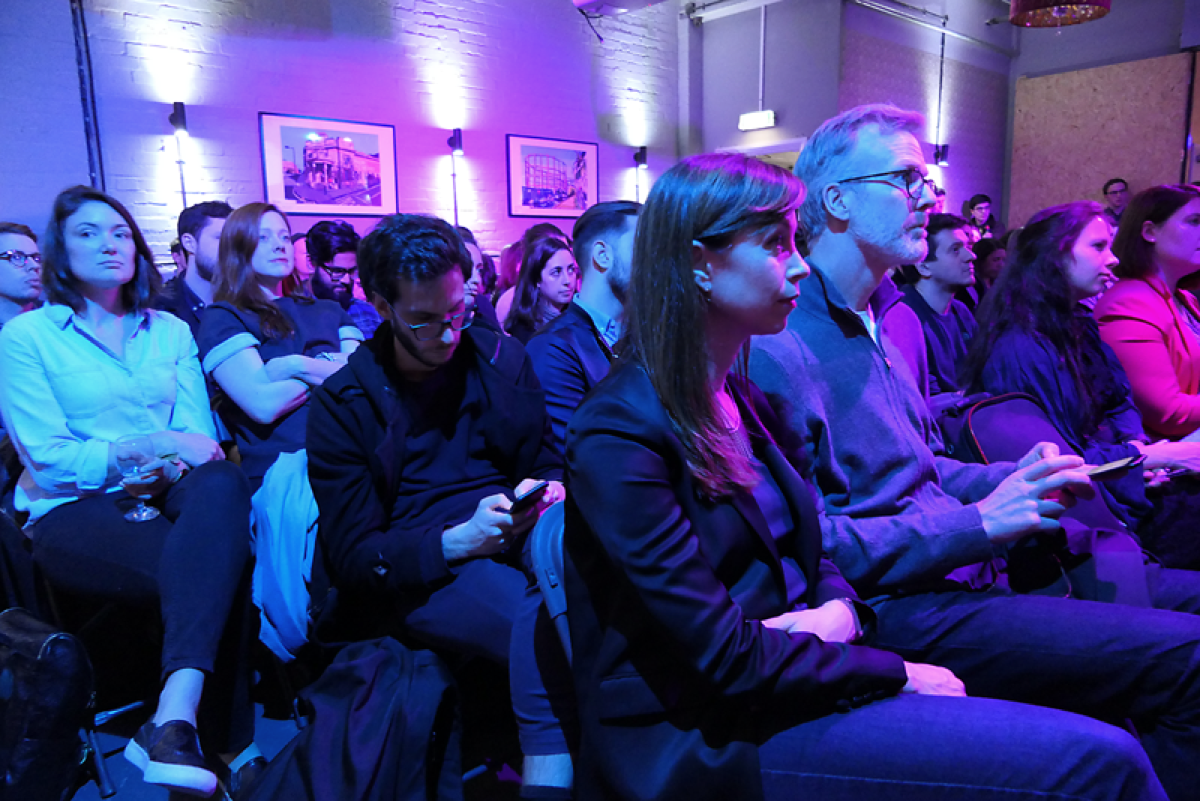This March, we were super proud to sponsor Design Club - the event where the creative community figure out what’s next. This time the loyal crowd of designers and creatives flocked to Hackney House and piled inside in their masses for insightful discussion and some drinks on to go with it. This one sold out in record time of 2 minutes, so be sure to head over to their site and sign up to the Design Club newsletter for early bird access.

Photo by Howard Grey.
As designers (or design thinkers!), it’s easy to focus on the job at hand, the problem to solve, the best iteration possible. Previous Design Club events have focused on this too – giving the stage to people who’ve gone deep on a challenge and taken big leaps forward with the resulting product, service or business.
Design Club's last event, however, zoomed out a little to consider the wider, systemic impact that design can have on all our lives.
First up, we heard from Chris Grantham, Circular Economy Portfolio Director at IDEO — the company famous for their innovative work and widely adopted Human-Centred Design process. Planning for a Circular Economy has developed as design has evolved and spanned into new areas - from products, to companies to economic systems. Not only that but who we are designing for has progressed from a single user to ‘an intimately connected web of people’.
IDEO have created an accessible guide for people to learn about the new process developed around a new mindset for business, which has the potential to reshape everything in our lives. Their guide has been tailored ‘to help innovators create more elegant, effective, creative solutions...solutions that are invaluable for people, give businesses a competitive advantage, and are regenerative for our world.’
"Circular design is a process which has the potential to reshape everything in our lives."
But, as Chris suggests, Circular Design goes beyond a series of steps to be followed: “It’s a shift in mindset – it’s about making connections you hadn’t seen before”. As we put more pressure on already stretched resources, Circular Design encourages design thinkers to see their work as something with greater impact and capability beyond its immediate and obvious application.

Chris Grantham, photo by Howard Grey.
Perhaps the most the most relevant point for digital designers came up during Chris’ Q&A, where an audience member asked what digital’s role was in a circular economy where the emphasis was on physical objects.
Chris explained that digital was the ‘fuel’ that powered the circular economy. Connected objects, machine learning and A.I would all contribute to better data-led insights, more accurate scenario modelling, and increased productivity, efficiency and allocation of resources. If, as Chris is predicting, we move into a circular economy, design that’s radical, restorative and regenerative will be critical.

Speaking of things evolving and adapting, the next speaker Sara Allen, Founder of job sharing consultancy, Further&More, had some interesting points to make about the future of working life.
Like Chris, Sara not only encouraged the Design Club audience to take a long-view on their career, but to broaden their perspective and see their careers in a totally different light. Sara, who previously led major health initiatives at the Cabinet Office (that’s like, in Westminster, not some cool new startup!), experienced first-hand the difficulty in balancing a demanding, high-level job with family life.
Sara discovered that job sharing (where two people share one role) makes the work/life balance easier, and ensures important jobs continue to be done at the highest possible standard by bringing two heads together over a single challenge. As Sara somewhat joked, “there are literally no downsides!”

Sara Allen, photo by Howard Grey.
Sara went on to describe how job-sharing isn’t just for parents — it allows people to start and run their own businesses, and explore or develop other skills and interests. One day, Sara says, it could even pave the way for professional partnerships with machines. Sara’s introduction to this new working pattern got everyone talking in the bar afterwards, as people discussed what job-sharing would look like for them, and their role.
"Our days shouldn't just be about designing products, but also about designing our lives."
As always, Design Club 5 was a thought-provoking night that gave us all lots of new ideas to think about and experiment with. To read the Circular Design Guide click here, and find out more about job sharing here.
